| Cover Story
From Kishoreganj
Islamuddin Palakar: A Storyteller
Rafi Hossain
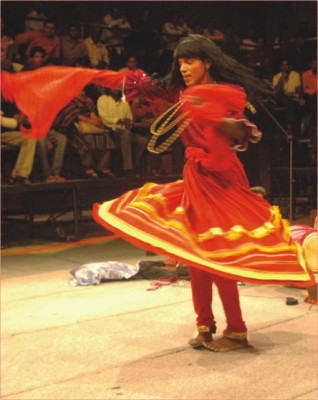 |
Photos by Amirul Rajiv |
Islamuddin Palakar's acting career wasn't gaining full momentum when he was stuck inside his house. Certain rural art forms are hard to exhibit in the city, it seems, and when attempted, it is just not good enough. Something gets lost in translation. The palakar's performance is done in an open field with instrumentalists and avid viewers surrounding him. These performances start pretty late. They go on for a long time, often all night. I had heard about Islamuddin Palakar for quite some time, but I had not had the chance to see his performances, which I had long wanted to. Since I never had the chance to see his performance in Kishoreganj, when he finally came to Dhaka I was excited about seeing him. I thought, if the show were arranged just as it had been in the villages, then the true flavor of his act would come through. The theme of that particular evening was Islamuddin's own life story. Islamuddin claims that in all these years of the art, no one has yet done an autobiographical palakar performance- he claims he is the first. In terms of form, there is no change. It is just that instead of the types of stories that are usually told, Islamuddin has decided to tell the story of his own life. A person's life, of course, is like a novel, but when it is translated to the form of a performance, a beautiful script is necessary. When he narrates the story of his life, his pace isn't even. Some parts- happy parts- are emphasized while others are spoken of less. Besides, he is still alive which means his story is incomplete, and he is young as well. This is no doubt a brave effort, the task of telling one's own story. The story may have been more compelling if he had been older and his life had been more complete. As it stands, his story seems too incomplete. Hopefully Islamuddin Palakar will keep that in mind. A young artist like Islamuddin could tell the stories of not just himself, but also the biographies of older, more accomplished palakars, which would not only have compelling stories, but would also be a tribute to those artists. We hope Islamuddin will take this into consideration. Since he is still young, he can experiment with these ideas.
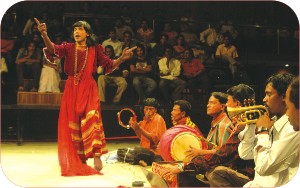 Islamuddin is a family man. He does not have all that much interest in school. This is how he starts his story. He grew up just like other kids in the village. He wasn't interested in any formal training. One day in a jatra in the village, an interesting thing happened. The lead actor was missing. Despite objections from his very religious family, Islamuddin decided to be a part of the play and started rehearsing for it. Later the owners of the jatra team initiated him as one of their own. He was successful in his performances. Islamuddin is a family man. He does not have all that much interest in school. This is how he starts his story. He grew up just like other kids in the village. He wasn't interested in any formal training. One day in a jatra in the village, an interesting thing happened. The lead actor was missing. Despite objections from his very religious family, Islamuddin decided to be a part of the play and started rehearsing for it. Later the owners of the jatra team initiated him as one of their own. He was successful in his performances.
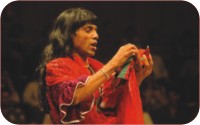 Both the jatra team and the audiences were pleased with him. Many days passed in this manner. Suddenly some tragedy occurred in the family, and he returned home. At this point, he started thinking that he wanted to do something new, something individual. He wasn't getting as much satisfaction out of the group jatra as he had towards the beginning. Around this time he heard of Kuddus Boyati. One day he heard that Kuddus Boyati had come to perform in one of the surrounding villages. He was impressed beyond words by Kuddus Boyati's performance, adding to the fact that he had already admired him in his mind even before seeing him live. He didn't speak to Kuddus at the time. Later he obtained Kuddus's home address and told him that he wanted to be his disciple. Kuddus invited him over and told him they would discuss the matter. One day, he secretively went on his way for Kuddus's home. Kuddus agreed to be his mentor, but wanted six to seven thousand taka from him in return. In addition, Islamuddin would have to stay at his place and help out with household work. He went back home, sold his bicycle and other things and got taka 3,500 in cash and returned to Kuddus Boyati. He told Kuddus, “Guru, I have only collected taka 3,500, please accept this.” Kuddus was at first reluctant. He wanted the sum he had initially asked for. But Islamuddin was adamant, he would stay. Eventually Kuddus agreed. Days passed, Islamuddin worked at Kuddus's household, but Kuddus hadn't taught him anything yet. A whole year passed by in this manner. Kuddus kept telling him that he would teach him things in time, but kept delaying it. Islamuddin was very frustrated by all this, but still had a strong resolve to stay until he had learnt something. Both the jatra team and the audiences were pleased with him. Many days passed in this manner. Suddenly some tragedy occurred in the family, and he returned home. At this point, he started thinking that he wanted to do something new, something individual. He wasn't getting as much satisfaction out of the group jatra as he had towards the beginning. Around this time he heard of Kuddus Boyati. One day he heard that Kuddus Boyati had come to perform in one of the surrounding villages. He was impressed beyond words by Kuddus Boyati's performance, adding to the fact that he had already admired him in his mind even before seeing him live. He didn't speak to Kuddus at the time. Later he obtained Kuddus's home address and told him that he wanted to be his disciple. Kuddus invited him over and told him they would discuss the matter. One day, he secretively went on his way for Kuddus's home. Kuddus agreed to be his mentor, but wanted six to seven thousand taka from him in return. In addition, Islamuddin would have to stay at his place and help out with household work. He went back home, sold his bicycle and other things and got taka 3,500 in cash and returned to Kuddus Boyati. He told Kuddus, “Guru, I have only collected taka 3,500, please accept this.” Kuddus was at first reluctant. He wanted the sum he had initially asked for. But Islamuddin was adamant, he would stay. Eventually Kuddus agreed. Days passed, Islamuddin worked at Kuddus's household, but Kuddus hadn't taught him anything yet. A whole year passed by in this manner. Kuddus kept telling him that he would teach him things in time, but kept delaying it. Islamuddin was very frustrated by all this, but still had a strong resolve to stay until he had learnt something.
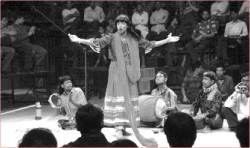 Once, Kuddus set off for a performance in some village. He had simultaneously taken a couple of jobs from a couple of different districts. When people from one district came to look for him, Kuddus was missing even though he had already committed to doing a performance there. Others assured them that Kuddus would show up for his performance if he had agreed to do it. The date arrived but Kuddus was still missing. People of the village came to Kuddus's house and protested angrily. Islamuddin assured them that there would be a show, and he himself gathered the courage to take this opportunity. On the one hand, he wanted to save his guru from the wrath of the villagers, but he also wanted to perform himself. He took the job and performed in Kuddus's place. At first people were quite annoyed, they had come to see a Kuddus performance but instead, the performer, Islamuddin was an unknown. But when Islamuddin finally started, they all went quiet. The performance was a hit. When it was over, people encouraged him to do more shows. Other villages wanted to have him over too. Kuddus did not take this very well. Islamuddin at first, thought Kuddus would take this well, but as it turned out, Kuddus was not all that pleased. He gave all his earnings to Kuddus as his guru, but Kuddus did not give any of that money back to Islamuddin. Islamuddin was a little hurt by this; he thought he would get some of the money back. Kuddus, surprised, asked him, “Where did you learn to perform like this?” He replied, “I had acknowledged you as my Guru from the start. I was always in awe of your performance. I watched you and I learnt. I basically performed what I had seen you do.” Once, Kuddus set off for a performance in some village. He had simultaneously taken a couple of jobs from a couple of different districts. When people from one district came to look for him, Kuddus was missing even though he had already committed to doing a performance there. Others assured them that Kuddus would show up for his performance if he had agreed to do it. The date arrived but Kuddus was still missing. People of the village came to Kuddus's house and protested angrily. Islamuddin assured them that there would be a show, and he himself gathered the courage to take this opportunity. On the one hand, he wanted to save his guru from the wrath of the villagers, but he also wanted to perform himself. He took the job and performed in Kuddus's place. At first people were quite annoyed, they had come to see a Kuddus performance but instead, the performer, Islamuddin was an unknown. But when Islamuddin finally started, they all went quiet. The performance was a hit. When it was over, people encouraged him to do more shows. Other villages wanted to have him over too. Kuddus did not take this very well. Islamuddin at first, thought Kuddus would take this well, but as it turned out, Kuddus was not all that pleased. He gave all his earnings to Kuddus as his guru, but Kuddus did not give any of that money back to Islamuddin. Islamuddin was a little hurt by this; he thought he would get some of the money back. Kuddus, surprised, asked him, “Where did you learn to perform like this?” He replied, “I had acknowledged you as my Guru from the start. I was always in awe of your performance. I watched you and I learnt. I basically performed what I had seen you do.”
Islamuddin gradually realized that he wasn't learning very much under Kuddus's wing. He was being asked to do shows himself from different villages, and so he decided to leave and see his own way. He paid his respects to his guru and bid farewell. He started to perform in one district after another and very quickly became well known. He started getting plenty of offers for work and became a little celebrity in his own right.
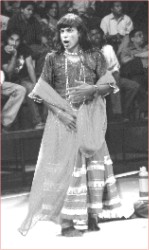 This is how Islamuddin Palakar described the story of his life that evening. In his performance, anger and resentment towards his guru, sometimes love and respect, sometimes the frustration of not being able to learn, lack of acknowledgement was a recurring theme. This is how Islamuddin Palakar described the story of his life that evening. In his performance, anger and resentment towards his guru, sometimes love and respect, sometimes the frustration of not being able to learn, lack of acknowledgement was a recurring theme.
A true artist has a genuine desire to learn. He wants to learn from the right guru. If one has the true merit and remains on the right path, nothing can stop him from achieving his goal. A true artist will undoubtedly find the right path sooner or later. If someone truly acknowledges someone as their guru, and gets to meet them, no matter how unjust the guru seems, the guru should not be belittled in front of people. One belittles oneself by doing that, more than one belittles the guru. Islamuddin should keep that in mind. One cannot rise by belittling others, particularly one's guru. Genuine artists never try to rise by making others look smaller. One is known by one's work, one's art. Islamuddin is a simple man, and he has earnestly described his struggle. Some others, however, are provoking him to spill beans and badmouth others. Islamuddin should stop listening to others and just follow his own instincts in favor of his art. We will hope he will continue to perform and impress us like he did that evening.
Copyright
(R) thedailystar.net 2007 |
|
